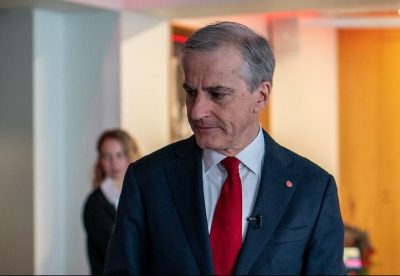Prime Minister Erna Solberg could finally gather her Conservative Party (Høyre) colleagues for their annual national meeting on Friday, and she’s keen for them to bulldoze their way towards re-election next fall. The meeting comes six months after Solberg had to shut down much of the country to contain the Corona virus, but now she’s back on the political offensive.

Armed with strong public opinion polls and generally high marks for how her government has handled the Corona crisis, Solberg now needs to also pay attention to other matters like tax and immigration policy, and the hotly contested future of Norway’s oil industry. She’s under huge pressure to keep doling out money from the country’s huge Oil Fund to ward off bankruptcies and preserve jobs during the Corona crisis, and will need to present her government’s proposal for next year’s state budget in just a few weeks.
She also needs to remain vigilant about Corona-related restrictions that are increasingly aggravating a Corona-weary population. Her party’s annual meeting reflected that itself, cut down from a full weekend to just a single afternoon at a hotel adjacent to Oslo’s main airport at Gardermoen. Everyone will be seated at one-meter distances from one another, and none of the traditional hugs and close conversations will be allowed. It’s also been dubbed as a “hybrid meeting,” where only the Conservatives’ ministers and board members who are up for re-election to their posts and members of the local chapter Viken Høyre are gathering at Gardermoen. The rest will gather at county meetings around the country.
Their agenda was heavy on administrative issues, with the most extensive debate on the party’s platform due next spring. Political discussion was unavoidable, however, not least after the party’s program committee just presented its first draft of the policies Høyre will pursue.
Wooing back Progress
They include stricter immigration policy, more liberal alcohol policies and another proposal to allow shopping on Sundays. At first glance they all appear geared towards renewing the support of Norway’s second-largest non-socialist party, the more right-wing Progress Party, which also wants to cut taxes on alcohol, soft drinks and other food and beverage items. Progress withdrew from Solberg’s conservative coalition government in January and she’s welcoming them to return, despite lots of problems and conflicts within Progress and an embarrassing court trial now underway. Progress consistently claims it won’t support any government of which it’s not a member, but much of the Conservatives’ new agenda would likely appeal to Progress’ own.
That could also come at the expense of Solberg’s current government partners, the Christian Democrats and the Liberals, but both have lost so much voter support that they may not have much clout of their own. Solberg clearly wants them to grow and strengthen her coalition, but it’s hard to see how they can do that when her poltical agenda is often at odds with theirs. Both of the small centrist parties encourage more liberal immigration policy, for example. This week’s tragedy at the Moria refugee camp in Greece and Solberg’s widely ridiculed offer to take in just 50 of the 13,000 refugees now homeless once again literally fanned the flames of disagreement within her government. The Christian Democrats want to take in far more refugees than Norway does now (3,000 a year through the UN’s quota program) and many more from Moria.
Solberg climbs in the polls, while Labour sinks
While both the Christian Democrats and Liberals continue to languish with less than 4 percent of the vote in the most recent public opinion poll, though, Solberg’s Conservatives climbed again to command 27 percent. Progress also rose, if slightly, to 10.3 percent in the poll conducted by research firm Opinion for media outlets Dagsavisen, ANB and Frifagbevegelse.

The best news for Solberg was how the arch-rival Labour Party sunk once again, to an historically low 19.9 percent of the vote. That makes it almost equal in size to the protectionistic (some say populist) Center Party, which claimed 16 percent, and raises even more concern over Labour’s failure to generate more support. Norwegian Broadcasting (NRK) reported this week that another 600 people have resigned from the party recently, following more uproar over the pending (but halted) return to power of party veteran Trond Giske who continues to be a target of sexual harassment complaints. Labour is also losing its industrial voter base and few seem inspired by party leader Jonas Gahr Støre. “Labour just isn’t the same,” Håvard Stamnestrø, a longtime party member and labour union leader in Trøndelag, told NRK this week. He thinks Labour has lost its steam and let voters down for not improving schools and elder care at the local level, or industrial policy at the national level.
Green challenge
Both Solberg and Støre, however, are under increasing pressure from those who want Norway to become much less dependent on its oil industry and much more climate friendly. They want greener industrial and job development. None of the political parties in Norway can ignore the Greens Party’s success, not least after it logged the single biggest gain in the most recent poll and now commands 7.5 percent of the vote. That makes them bigger than the Socialist Left party (SV), which also edged up, but only to 6.9 percent.
Climate-concerned voters won’t like the Conservatives’ preliminary program proposal to take up the fight again to open the seas around scenic Lofoten, Vesterålen and Senja to oil exploration and production. They firmly oppose the Norwegian oil industry’s constant expansion into the Arctic, and the looming likelihood that Norway won’t meet the UN’s climate goals.
More political debate will surely resume as the Corona crisis wanes with a vaccine and the election looms. On Friday, Solberg could expect a warm welcome from her party faithful. The 59-year-old party veteran also said on national radio Friday morning that she will continue to stand for re-election as party leader and prime minister for as long as the party wants her.
NewsInEnglish.no/Nina Berglund

